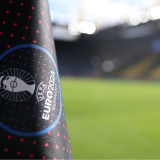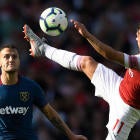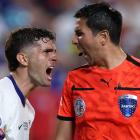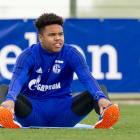Mesut Ozil exchanged No. 11 for No. 10 over the summer, but Arsenal's most important player still dons the No. 11 shirt. Lucas Torreira, a 5-foot-5, 22-year-old Uruguayan defensive midfielder who transferred from Sampdoria before the season, is the catalyst of Arsenal's unlikely, early rise in the Premier League.
Through the first eight fixtures, Arsenal are in fourth place and only two points behind the Manchester City, Chelsea, and Liverpool logjam atop the table despite undertaking a massive rebuilding project under a new manager for the first time since the Stone Ages. This -- Arsenal emerging as possible title contenders so soon under new management -- wasn't expected.
The how, however, is simple. Without Torreira on the field, Arsenal have allowed 10 goals and scored nine in roughly five matches worth of minutes. With Torreira on the field, Arsenal have allowed three goals and scored 20 in roughly six matches worth of minutes.
Arsenal are a completely different team when Lucas Torreira is on the field. pic.twitter.com/otsHJgZIh2
— ESPN FC (@ESPNFC) October 12, 2018
It doesn't take a degree in soccer to understand the decline that has plagued Arsenal, a club with a rich history that has slipped into a period of complacency. Under Arsene Wenger, the legendary manager who guided Arsenal from 1996 to 2018, the club went from revered and feared to incapable of challenging for the Premier League title and settling for FA Cup trophies to the dreaded Europa League. There were many culprits along the way, with Wenger's outdated tactics being one of them, along with his inability to build a strong defense that could stop the sort of attackers that top-four teams feature, from the Eden Hazards to the Harry Kanes to the Mohamed Salahs of Champions League soccer.
Those faults eventually cost Wenger his job last season, which resulted in Arsenal's second straight finish outside the top four after the club avoided such a dishonor for two decades. Unai Emery entered the fray, taking over for Wenger as the stricter, juice-banning coach who lost his first two matches against Manchester City and Chelsea. He proceeded to rip off nine consecutive wins across all competitions, six of which occurred in the Premier League.
Emery deserves acclaim for Arsenal's return to the Champions League portion of the table. So do Pierre-Emerick Aubameyang and Alexandre Lacazette, both of whom have scored four goals in Premier League play. Mesut Ozil remains underappreciated and unfairly maligned, and he's suddenly scoring! Aaron Ramsey, who is headed toward a departure from the club, is still producing memories that will be cherished for some time. Alex Iwobi suddenly looks like a starting-caliber player in Emery's system. Hector Bellerin's contributions down the right flank haven't gone unnoticed. Granit Xhaka, no longer burdened with a task he can't fulfill, is finally playing the role for which he's best suited.
But Arsenal's rise wouldn't be at all possible without Torreira. He keeps them glued together.
Arsenal's problem has never been scoring. Last season, when they placed sixth in the Premier League, Arsenal tallied the third-most goals (tied with Tottenham). So far this season, under a new manager who uses a new formation and a new philosophy, Arsenal have maintained their attacking proficiency, scoring the second-most goals in England -- only reigning champions Manchester City have scored more. The problem has always been the defense. Last season, they allowed 13 more goals than fourth-place Liverpool.
The Gunners are quietly improving defensively. If you erase Arsenal's first two Premier League matches against Manchester City and Chelsea, when Arsenal allowed five goals while adjusting to Emery's system against two trophy-caliber teams, they've allowed five goals in six matches. That might seem unfair -- to wipe away their record against two top teams -- but considering how many goals Arsenal gave up to inferior opponents a year ago, what they've done against lesser foes so far this season is progress.
Last season, Arsenal allowed 19 goals in eight matches against the eventual top-four finishers, which means they allowed 32 goals in their remaining 30 matches or 1.07 goals per match. In their past six Premier League matches against teams not considered to be Champions League contenders, Arsenal have averaged 0.83 goals against. That might not seem significant, but over a course of 30 matches, those averages result in an overall difference of about seven goals. For that improvement, Arsenal can thank Torreira.
Under Emery, Arsenal typically function within a new formation best categorized as a 4-2-3-1, but most of the personnel remains the same (swap out injured center back Laurent Koscielny for Sokratis Papastathopoulos) with the remarkable exception of Torreira, who slots in as a defensive midfielder alongside the oft-criticized Xhaka, who is best utilized as a deep-lying playmaker rather than a midfielder who can defend.
Together, they form the defensive midfield playing behind the likes of Ozil, Ramsey, and Aubameyang. In other words, they're the 2 behind the 3 in the 4-2-3-1. They're not just responsible for getting the ball to the goal creators. They also serve as a buffer between the attack and the defense so that opposing counterattacks don't pick up momentum with 30 yards of open space in the middle of the pitch. They're there to make sure the back line isn't left alone on an island.
A year ago, Arsenal asked Xhaka to be their Torreira. Except that, while Xhaka can jump-start an attack with a pinpoint long ball, he doesn't have the quickness or awareness to dart into passing lanes to intercept passes, the composure and quickness to play out of intense pressure, or the discipline to keep his positioning in the center of the pitch. What became so clear over the course of last season, while Arsenal fans crucified Xhaka for his errors, is that Xhaka needed a defensive-minded partner to alleviate the responsibilities that come with being positioned in that portion of the pitch.
Enter Torreira -- after a brief delay.
Despite an impressive showing at the World Cup, Torreira failed to earn a starting job with Arsenal entering the season. Emery couldn't have asked for a more difficult beginning to his Arsenal career with fixtures against Manchester City and Chelsea. Torreira was brought on as a substitute in both of those matches, and while his tenacity and energy immediately affected those matches, he experienced what are best described as growing pains -- namely his role in Chelsea's late winner when he let Marcos Alonso drift away from him at the top of the box and then failed to position himself goal-side, ball-side, which allowed Alonso to slot home the winner.
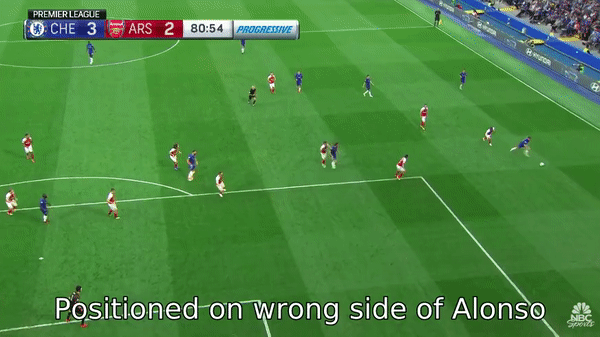
It was Torreria's second career Premier League match against a legitimate title contender, but in a show of how much this Arsenal team already expects of Torreira, they lit into him, as Football.London's Charles Watts chronicled at the time:
Immediately after the full-time whistle, as some of the Arsenal players made they way over to thank the away fans in the Shed End, Torreira found himself being approached by Juan Carlos Carcedo.
Emery's assistant head coach was clearly angry at the way Torreira had let Alonso get away from him to score the crucial winning goal.
Carcedo stood for over a minute in deep discussion with Torreiria, pointing to the area of the pitch where the goal came from and going through what he had done wrong. Torreira took it all in before Carcedo spun round and made his way back to the changing room, leaving Torreira to applaud the Arsenal fans before following him down the tunnel.
It was a sign of the new intensity that the Arsenal coaching staff are working to that Carcedo didn't even wait for Torreira to get back into the changing room before taking the midfielder to task.
Torreira didn't make his first start until their Europa League opener on Sept. 20. His first Premier League start didn't come until Sept. 23 against Everton.
He was worth the wait.
Arsenal finally found a defensive midfielder capable of hounding attackers like a shark with blood in the water and running around the center of the pitch like an energizer bunny for a full 90. He leads Arsenal with 13 interceptions and is tied for third on the team with 12 tackles in Premier League play. He's the bridge between their arsenal of attackers, none of whom excel defensively, and a defense that needs all the help it can get. He's the dam that stops incoming attacks before they form a flood.
We finally have dominant, aggressive, good with the ball defensive midfielder after all these years. Just look what Lucas Torreira offers. pic.twitter.com/rKSiSrqUkg
— Lacazettes (@Lacazettes) October 9, 2018
The impact of a tackle-winning, turnover-creating midfielder goes beyond defense. Torreira doesn't just stymie incoming attacks during the buildup phase. He also helps initiate the Arsenal attack at the other end of the pitch. He's no Ozil, but he's still a good passer.
He set up Lacazette for Arsenal's match-winner against Cardiff City.
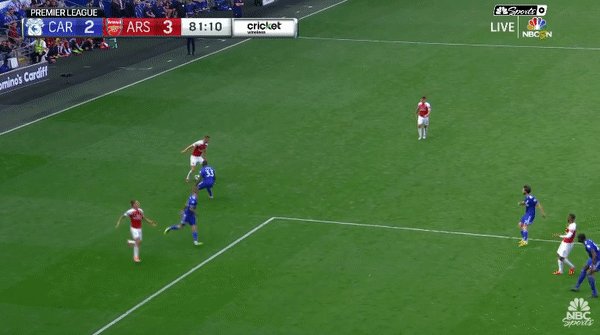
His interception with an outstretched leg sparked Lacazette's go-ahead goal against Everton. It was easy to miss, but his positioning and redirection that found Ramsey, who played in Lacazette, was the difference between a goal and a counterattack the other way.
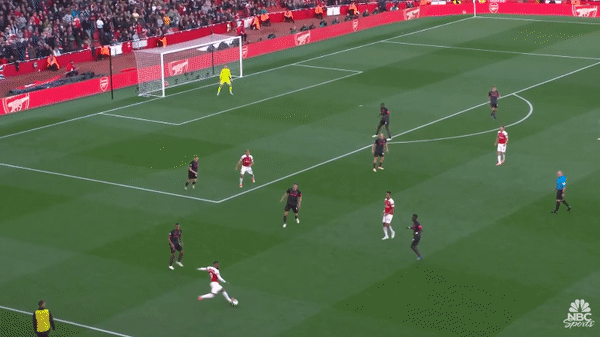
He makes those around him better.
Xhaka is suddenly thriving, enjoying his best season in London. With Torreira alongside him, Xhaka is able to focus on the strength of his game (passing) rather than the weakness (defending).
For as much criticism as Arsenal's center backs have received over the past couple years -- much of it deserved -- they were often placed into unfortunate situations, ones that asked them to defend huge blocks of space due to the midfield's complete inability to contribute defensively. Arsenal would give up possession and then there'd be a colossal gap for enemy attackers to sprint into toward the Arsenal back line.
That problem has been fixed by Torreira's positioning, instincts, quickness, and strength.
"When he is off the pitch he is so calm but when he is on the pitch it is like Transformers -- he becomes crazy," Sokratis, one of two starting center backs, told the club's website. "He works very good, he is small, but he is strong enough. I like him very much because he gives everything, he tries to defend every time, and when we have players who do this work in front of us, it is very important."
After watching a defensively inept team for far too long, Arsenal fans are already showering him with love.
Love this from the Arsenal away fans yesterday. Lucas Torreira wins back possession and the Uruguayan's own chant begins to break out.
— Chris Wheatley (@ChrisWheatley_) October 8, 2018
'He comes from Uruguay, he's only 5ft high' pic.twitter.com/nEx74B1Gyx
That right there is the package Torreira offers: A steal to end a threat before launching an attack the other way.
Not long after, Arsenal put the finishing touches on their 5-1 drubbing of Fulham, during which Torreira recorded six tackles, the most by an Arsenal player in a match this season, according to Squawka. That win pushed their record to 6-0-2 in Premier League play. They've now won their past nine matches across all competitions. They're already in control of their Europa League group (as they should be given the level of competition) and only two points behind the leaders in the Premiership while slotting in ahead of Tottenham on goal differential.
It's early. More advanced statistics say Arsenal should really be in 11th place. They probably won't keep winning at this rate unless they improve dramatically, which is entirely possible given they're still learning how to operate within a brand new system. Arsenal's schedule has been relatively soft thus far. After losing to Manchester City and Chelsea to begin the season, the best team they've played has been Watford. These are all matches Arsenal should've won, but the difference is that they almost assuredly would've dropped some points along the way in previous seasons. This year, they went six for six. Beating bad teams matters.
While Arsenal appears to be much approved under Emery, they're probably not going to win the Premier League over the teams positioned above them. And that's OK. In the beginning stages of a rebuild, Arsenal would be ecstatic with a return to the Champions League whether that's through the side gate the Europa League offers or a top-four finish in the Premiership. That's the goal.
The schedule picks up. They'll have to face Tottenham, Manchester United, and Liverpool (twice) before the new year.
But when Arsenal faces such teams, they'll finally have some teeth in their midfield, a trait that's been lacking for several seasons. Ozil is a wizard on the ball, but he's not contributing on defense. Ramsey is a creator, not a defender. Xhaka operates from a deep position, but he's not disciplined defensively. Arsenal's midfield has always been talented, but it'd often lacked strength -- not the kind of mental toughness for which pundits have unfairly criticized Ozil, but vigor. Suddenly, Arsenal can expect to go into a battle and come out on the other side bloodied, but victorious. Top teams need a disciplined player who can win those dirty fights in the muck of the pitch. Now, Arsenal has one.
It's ironic that the player responsible for Arsenal's transformation from delicate to stout is the smallest figure on the pitch, a 5-foot-5, 22-year-old Uruguayan who joined Arsenal for a £25 million fee, a price that pales in comparison to the cash that top players often draw on the transfer market. Manchester City paid £60 million for Riyad Mahrez. Liverpool paid £43.7 million for Fabinho and another £53.75 million for Naby Keita.
Torreira is just as important to his new club as -- if not more important than -- those players are to theirs. Those high-profile transfers enjoyed the benefit of joining teams with well-established, highly functional systems in place. They were the final pieces, the ice cream added to a slice of warm apple pie. They joined title contenders.
Torreira joined a team in transition. Without Torreira on the pitch, Arsenal's rebuild appears to be in its beginning stages. With him on the pitch, Arsenal's rebuild looks less like a rebuild and more like a remarkable turnaround. Torreira didn't join a contender, but he might be transforming Arsenal into one.




